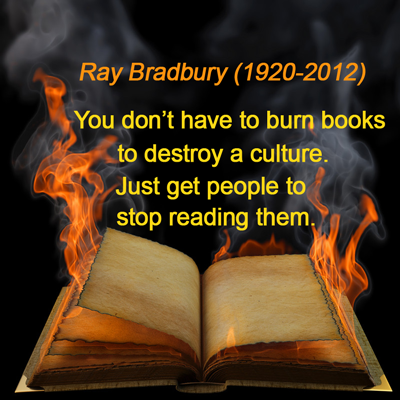 Back in 1953 Ray Bradbury published a dystopian science fiction/fantasy novel called Fahrenheit 451. If you’ve not read it, do! It’s not only a rattling good story, but it remains soberingly relevant today.
Back in 1953 Ray Bradbury published a dystopian science fiction/fantasy novel called Fahrenheit 451. If you’ve not read it, do! It’s not only a rattling good story, but it remains soberingly relevant today.
In fact, in many ways, we are living in the future Bradbury imagined.
Ok, so perhaps nowadays (at least in most parts of the world) we don’t burn books instead of reading them. “Fahrenheit 451” is apparently the temperature at which paper will self-ignite, hence the title of the book. In the world of Bradbury’s story, books are strictly banned, ideas are frowned on and firemen are employed to start fires (to burn any books found) not to put them out. There’s a clear connection here of course with all totalitarian regimes that have existed before Bradbury’s time as well as since. He was no doubt thinking of Nazi book burnings, Stalin’s purges … and McCarthy-ism as well.
But even without those connections, there are other ways in which Bradbury’s fiction and our reality are at times frighteningly similar!
In the novel, one’s status is in part determined by how many and how large one’s TV screens are. Montag (hero of the story) was under pressure from his wife to install more TV screens to achieve the ultimate status – a room with all four walls broadcasting into their living space at once.
And as for what was broadcast … mostly shows that were about ‘the family’. Think soap-opera-style story lines, with characters in whom the audience became deeply invested and with whom they engaged in interactive dialogue to become part of the on screen story and a member of ‘the family’.
Reality TV anyone? I’ve lost count of how many conversations I’ve overheard in which folk are talking about people in those so-called (because of course they are highly manipulated and even scripted) ‘reality’ shows, as if they were personal friends or acquaintances.
And in how many of our public spaces – cafés, restaurants, hospitals, waiting rooms and (gasp!) now many railway station platforms – are we assaulted by advertisements or seemingly inane shows blaring from large, strategically placed TV screens?
There is seemingly no escape!
 In Bradbury’s world many people were also drugged out in a state of medicated ‘happiness’ and compliance. Drugs? Yes, we know about those don’t we. And I don’t simply mean the ‘heavier’ drugs used by those often dismissed as addicts. I’m thinking such things as alcohol, cigarettes, marijuana, prescription drugs and ecstasy – the ‘party’ drug. It all sounds very like Bradbury’s dystopia!
In Bradbury’s world many people were also drugged out in a state of medicated ‘happiness’ and compliance. Drugs? Yes, we know about those don’t we. And I don’t simply mean the ‘heavier’ drugs used by those often dismissed as addicts. I’m thinking such things as alcohol, cigarettes, marijuana, prescription drugs and ecstasy – the ‘party’ drug. It all sounds very like Bradbury’s dystopia!
In Fahrenheit 451, people have become consumers and social ‘drones’. They’re drugged up, disconnected from one another and de-sensitised. They’re “plugged in” to commercial and media-driven information instead of one another. Manipulated and numbed, unable to think independently.
Hmmm … and now I’m also thinking of George Orwell’s novel 1984! Don’t get me started!
However I am essentially an optimist about human nature and our human future. I certainly don’t envisage a world as bleak as either Bradbury or Orwell.
But if we want the future I (and no doubt most of you) see as possible and desirable, Bradbury’s and Orwell’s stories serve to remind us of what’s really important.
We need to switch off and tune out of the myriad of media with which we are daily bombarded and ‘tune in’ to one another instead.
And yes, I know modern technologies and media can also be ‘used for good’ to help us do just that.
So let’s take a lesson from Bradbury and Orwell to use those tools mindfully, not mindlessly. We need to connect … really connect … with one another in genuine, heartfelt conversations about what matters.
Let’s not numb ourselves to the world, but come together to give life and vibrancy to our human systems.
And let’s bring the best of ourselves and invite the best of others into that quest.
Leave a Reply